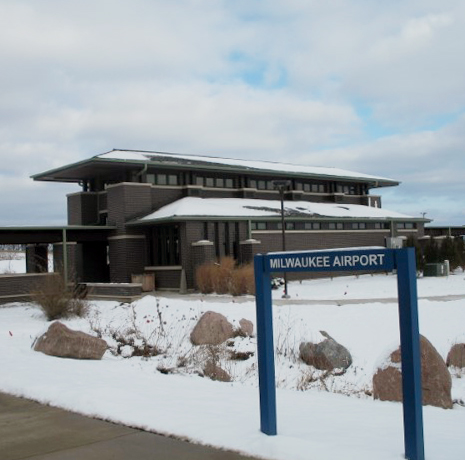Milwaukee Airport-Trains, WI - General Mitchell International Airport (MKA)
The station opened in 2005 and is one of only a handful in the Amtrak system that offers access to an airport. It won an urban design award for being a “Prairie-style transportation symbol.”

General Mitchell International Airport
Amtrak Station
5601 South 6th Street
Milwaukee, WI 53221
Annual Station Ridership (FY 2024): 126,756
- Facility Ownership: Wisconsin Department of Transportation
- Parking Lot Ownership: Milwaukee County
- Platform Ownership: Wisconsin Department of Transportation
- Track Ownership: Soo Line Railroad (Canadian Pacific Railway)
Ismael Cuevas
Regional Contact
governmentaffairschi@amtrak.com
For information about Amtrak fares and schedules, please visit Amtrak.com or call 1-800-USA-RAIL (1-800-872-7245).
Note to Travelers: The Wisconsin Department of Transportation (WisDOT) is improving the General Mitchell International Airport Station by adding a new train platform west of the depot. The new 800-foot concrete platform will be linked to the depot with a pedestrian bridge over the tracks. This project, scheduled through early summer 2025, will improve freight and passenger operations and capacity, reduce train delays and travel time, and enhance passenger safety and accessibility.
Amtrak customers are advised that due to road paving at the station, no cars will be able to enter the drop-off lane effective March 18, 2024. Customers may enter the parking lot and park their vehicles free for 15 minutes to drop off and pick up. Anything over 15 minutes will cost $2 an hour. The airport shuttle will drop off and pick up in the parking lot during this time as well. View a map showing how to use the free 15-minute drop-off zone.
The modern brick and glass General Mitchell Airport station was begun in 2004 and opened on January 18, 2005. The 1,600 square foot heated facility includes restrooms and a seating area inside. Covered walkways lead to the drop-off area and the boarding platform. Located at the western edge of the airport near satellite parking, a free shuttle bus provides transportation to and from the passenger terminal.
The project began with a 2000 tour of the site by then-Wisconsin Governor Tommy Thompson. At that time, it was thought that the station would become part of a proposed statewide high speed rail network. The site being considered was envisioned to serve airport passengers and residents in Milwaukee’s southern parts who did not want to cope with traffic and parking downtown.
It was first estimated that $1 million would be required to build the airport station and do related track and signal work. In 2001 the airport project funding requirement was revised upward from $5 million to $8 million. By July, the state committed to spending $100,000 to study the station, with a projected opening in 2003. Funding sources became an issue, as neither the airlines nor the county were prepared to allocate those monies. U.S. Senator Herb Kohl helped to obtain $4 million in federal funding for the airport station, on top of the $2.5 million previously appropriated; the opening date was set for 2007.
The ground-breaking ceremonies were finally held on June 28, 2004 for the $6.5 million station, with then-Governor Jim Doyle, Senator Herb Kohl and state Transportation Secretary Frank Busalacchi attending. When the station opened, it became the fourth Amtrak station to directly serve an airport, along with Baltimore Washington InternationaI Thurgood Marshall, Newark and Burbank and the arrival and departure screens at Mitchell field list Amtrak trains along with the airline flights. In 2006, the station was given an Urban Design Award from Milwaukee Mayor Tom Barett for its design as a “Prairie-style transportation symbol.”
Milwaukee rests on the shore and bluffs of Lake Michigan, at the confluence of three rivers: the Menomonee, the Kinnickinnic, and the Milwaukee, with a number of smaller rivers flowing through the city as well. The region was first visited by European fur traders and missionaries in the 1700s, but not until French-Canadian explorer Solomon Juneau arrived were there permanent settlements. In 1846, Juneau’s settlement combined with two neighboring towns to form the City of Milwaukee; Juneau became the city’s first mayor.
Large numbers of German immigrants swelled the city’s population in the 1840s as they escaped wars in Europe. In addition to Germans, Milwaukee saw large influxes of immigrants from Poland, Italy and Ireland as well as many Jews from Central and Eastern Europe. By 1910, Milwaukee had the distinction of having the largest percentage of foreign-born residents in the United States.
Milwaukee became synonymous with Germans, beer, and brewing beginning in the 1850s. By 1856, there were more than two dozen breweries in Milwaukee, most German-owned and operated. It was once home to four well-known names in brewing: Schlitz, Pabst, Blatz and Miller. Wisconsin also became the second-largest wheat-growing state in the U.S. by 1860, shipping both by boat and rail through Milwaukee’s port.
The city’s function as a transportation nexus also contributed to a growth in flour mills, meat packing plants and tanneries. A distinctive cream-colored clay native to the area earned Milwaukee a reputation for its brickyards; the bricks were known as “Cream City” brick and by 1881, the largest brickyard in the world at that time was Burnham’s in Milwaukee. Along with processing, bulk storage, machining and manufacturing also entered the city’s economy.
Milwaukee today remains an industrial city, with brewing and manufacturing retaining a large portion of its economy. The city has also made strides in revitalizing various neighborhoods, enhancing the image of historic districts and attracting new businesses to its downtown.
Mitchell Airport, on Milwaukee’s southeast edge, close to Lake Michigan, is named after U.S. Army Air Service General Billy Mitchell, who was raised in Milwaukee and is often regarded as the father of the United States Air Force. The airfield was established in 1920 by businessman Thomas Hamilton, and was purchased by Milwaukee County in 1926. During World War II, the airfield was leased to the War Department as a prisoner of war camp. The name was changed to Mitchell Field in 1941, and officially to General Mitchell International Airport in 1986. The airport serves commercial, general aviation and military air flights.
The Hiawatha is financed primarily through funds made available by the Wisconsin and Illinois State Departments of Transportation (DOT). The Borealis is financed primarily through funds made available by the Minnesota, Wisconsin and Illinois DOTs.
Station Building (with waiting room)
Features
- ATM not available
- No elevator
- Payphones
- Quik-Trak kiosks
- Restrooms
- Unaccompanied child travel not allowed
- No vending machines
- No WiFi
- Arrive at least 30 minutes prior to departure
Baggage
- Amtrak Express shipping not available
- No checked baggage service
- No checked baggage storage
- Bike boxes not available
- No baggage carts
- Ski bags not available
- No bag storage
- Shipping boxes not available
- No baggage assistance
Parking
- Same-day parking is available for a fee
- Overnight parking is available for a fee
Accessibility
- Payphones
- Accessible platform
- Accessible restrooms
- No accessible ticket office
- Accessible waiting room
- Accessible water fountain
- Same-day, accessible parking is available for a fee
- Overnight, accessible parking is available for a fee
- No high platform
- No wheelchair
- Wheelchair lift available
Hours
Station Waiting Room Hours
| Mon | 06:00 am - 10:00 pm |
| Tue | 06:00 am - 10:00 pm |
| Wed | 06:00 am - 10:00 pm |
| Thu | 06:00 am - 10:00 pm |
| Fri | 06:00 am - 10:00 pm |
| Sat | 06:00 am - 10:00 pm |
| Sun | 07:45 am - 10:00 pm |
Ticket Office Hours
Passenger Assistance Hours
Checked Baggage Service
Parking Hours
| Mon | 12:01 am - 11:59 pm |
| Tue | 12:01 am - 11:59 pm |
| Wed | 12:01 am - 11:59 pm |
| Thu | 12:01 am - 11:59 pm |
| Fri | 12:01 am - 11:59 pm |
| Sat | 12:01 am - 11:59 pm |
| Sun | 12:01 am - 11:59 pm |
Quik-Track Kiosk Hours
| Mon | 06:00 am - 10:00 pm |
| Tue | 06:00 am - 10:00 pm |
| Wed | 06:00 am - 10:00 pm |
| Thu | 06:00 am - 10:00 pm |
| Fri | 06:00 am - 10:00 pm |
| Sat | 06:00 am - 10:00 pm |
| Sun | 07:45 am - 10:00 pm |


 Amtrak established the Great American Stations Project in 2006 to educate communities on the benefits of redeveloping train stations, offer tools to community leaders to preserve their stations, and provide the appropriate Amtrak resources.
Amtrak established the Great American Stations Project in 2006 to educate communities on the benefits of redeveloping train stations, offer tools to community leaders to preserve their stations, and provide the appropriate Amtrak resources. Amtrak is seizing a once-in-a-lifetime opportunity to transform rail and Retrain Travel. By modernizing, enhancing and expanding trains, stations and infrastructure, Amtrak is meeting the rising demand for train travel. Amtrak offers unforgettable experiences to more than 500 destinations across 46 states and parts of Canada. Learn more at
Amtrak is seizing a once-in-a-lifetime opportunity to transform rail and Retrain Travel. By modernizing, enhancing and expanding trains, stations and infrastructure, Amtrak is meeting the rising demand for train travel. Amtrak offers unforgettable experiences to more than 500 destinations across 46 states and parts of Canada. Learn more at